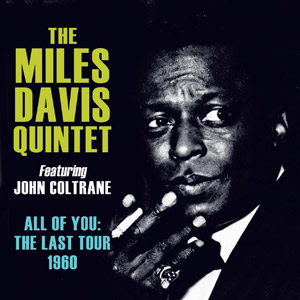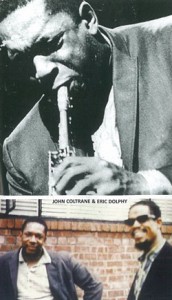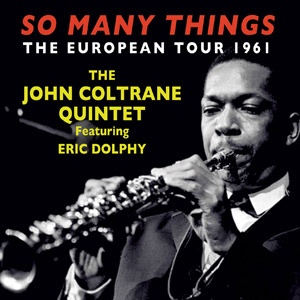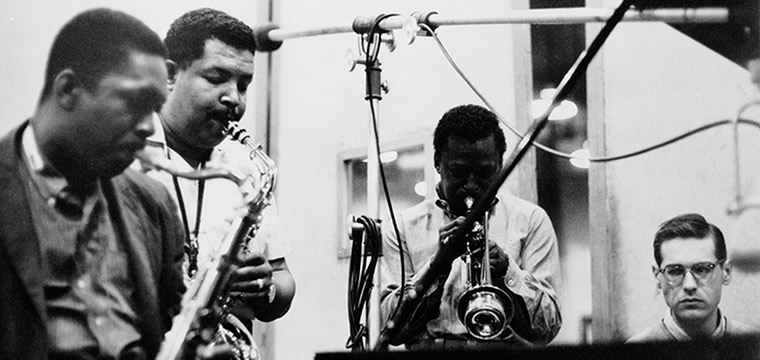 Miles Davis and John Coltrane are some of the most iconic figures in jazz music history. They took this musical genre to the next level with such influential albums such as Davis’ Kind of Blue and Coltrane’s My Favorite Things, but while these albums are polished and meant for mass consumption their live recordings possess the bulk of their creativity. Thanks to the nice folks at Trapeze Music & Entertainment we get to hear a glimpse of what made these guys legends with two 4-disc sets showcasing the final days of The Miles Davis Quintet, and the early days of The John Coltrane Quintet, which features legendary multi-instrumentalist Eric Dolphy. Both sets are culled from radio broadcasts and private recordings which have previously been available in a patchy and piecemeal fashion. This is the first time that a substantial body of the material recorded during the last Davis Quintet tour in 1960, and the first Coltrane Quintet tour in 1961 have been compiled in two one-of-a-kind collections.
Miles Davis and John Coltrane are some of the most iconic figures in jazz music history. They took this musical genre to the next level with such influential albums such as Davis’ Kind of Blue and Coltrane’s My Favorite Things, but while these albums are polished and meant for mass consumption their live recordings possess the bulk of their creativity. Thanks to the nice folks at Trapeze Music & Entertainment we get to hear a glimpse of what made these guys legends with two 4-disc sets showcasing the final days of The Miles Davis Quintet, and the early days of The John Coltrane Quintet, which features legendary multi-instrumentalist Eric Dolphy. Both sets are culled from radio broadcasts and private recordings which have previously been available in a patchy and piecemeal fashion. This is the first time that a substantial body of the material recorded during the last Davis Quintet tour in 1960, and the first Coltrane Quintet tour in 1961 have been compiled in two one-of-a-kind collections.
The first 4-disc set, All Of You: The Last Tour 1960, features Miles Davis on trumpet, Wynton Kelly on piano, Paul Chambers on bass, Jimmy Cobb on drums, and of course, John Coltrane on tenor saxophone. “After I joined Miles in 1955, I found that he doesn’t talk much and will rarely discuss his music,” Coltrane told one interviewer. “He’s completely unpredictable; and sometimes he’d just walk off stage after just playing a few notes, not even completing one chorus..,” and that unpredictability is evident throughout the recordings. One of many examples can be heard on the Zurich, Switzerland show from April 8th during “If I Were A Bell,” as the band leader plays one of the most pyrotechnic-filled solos of the tour.
 Although Davis wowed audiences with his seemingly random solos it was John Coltrane’s creative alchemy that garnered the most reactions on that tour. “Coltrane was the talking point of the show,” a journalist reported of one of the German concerts in March. “His unique sound roared and thundered through the hall. Every solo built to a terrifying frenzy. He seemed fascinated by a series of triplet crotchets which he repeated over and over again in every solo. Some of the audience became uncomfortable, some laughed in embarrassment, other covered their ears and a few walked out.” Upon listening to these recordings it is quite apparent that Coltrane is ready to go on his own. “I think he plays on that tour differently from how he plays on any other recording,” said saxophonist Simon Spillett, who assembled the collection. “You can hear the seeds of where he’s heading. He’s pushing the saxophone and its context to its limits. Already in his head he was hearing a very different accompaniment from what Wynton Kelly and Jimmy Cobb were giving him.” This tour marks the beginning of Coltrane’s rapid-fire sound which takes center stage a year later in his own quintet.
Although Davis wowed audiences with his seemingly random solos it was John Coltrane’s creative alchemy that garnered the most reactions on that tour. “Coltrane was the talking point of the show,” a journalist reported of one of the German concerts in March. “His unique sound roared and thundered through the hall. Every solo built to a terrifying frenzy. He seemed fascinated by a series of triplet crotchets which he repeated over and over again in every solo. Some of the audience became uncomfortable, some laughed in embarrassment, other covered their ears and a few walked out.” Upon listening to these recordings it is quite apparent that Coltrane is ready to go on his own. “I think he plays on that tour differently from how he plays on any other recording,” said saxophonist Simon Spillett, who assembled the collection. “You can hear the seeds of where he’s heading. He’s pushing the saxophone and its context to its limits. Already in his head he was hearing a very different accompaniment from what Wynton Kelly and Jimmy Cobb were giving him.” This tour marks the beginning of Coltrane’s rapid-fire sound which takes center stage a year later in his own quintet.
So Many Things: The European Tour 1961 is the next 4-disc set, and it features John Coltrane on tenor & soprano saxophone; Eric Dolphy on alto saxophone, bass clarinet, flute; McCoy Tyner on piano; Reggie Workman on bass; and Elvin Jones on drums. “There are so many things to be considered in making music,” Coltrane told an interviewer in the fall of 1961. “Many things on which I don’t think I’ve reached a final conclusion.” Despite Coltrane’s free flow sound with Davis’ quintet he was still a bit subdued, but with his own quintet he became the voice of progress, bravely reasserting the exploratory nature of jazz, pushing his core sound through constant reinvention, taking himself, his fellow players, and those who came to hear him on an impassioned journey of discovery, night after night.
 One of those nights was November 20, 1961, opening for The Dizzy Gillespie Quintet, Coltrane’s band got the show underway with a slick version of Victor Young’s “Delilah,” a song that doesn’t appear on any other recording from the tour or anywhere else in Coltrane or Dolphy’s discographies. Dolphy’s bass clarinet provides a warm backdrop to Tyner’s piano solo during a sexy rendition of ‘Naima,’ the song named after Coltrane’s wife from his first album, Giant Steps.
One of those nights was November 20, 1961, opening for The Dizzy Gillespie Quintet, Coltrane’s band got the show underway with a slick version of Victor Young’s “Delilah,” a song that doesn’t appear on any other recording from the tour or anywhere else in Coltrane or Dolphy’s discographies. Dolphy’s bass clarinet provides a warm backdrop to Tyner’s piano solo during a sexy rendition of ‘Naima,’ the song named after Coltrane’s wife from his first album, Giant Steps.
The show concludes with a scintillating 29 minute performance of ‘My Favorite Things,’ which demonstrates how far Coltrane was willing to take his sound. Beginning with a false start (it is one of the few times you hear Coltrane’s voice as he nicely informs the crowd that their applause messed up his timing), the band then comes out swinging on its second try with hypnotic rhythms that take listeners to a far off land. Dolphy’s use of the flute adds a beauty and grace to the song that doesn’t exist on other versions. By the end of the song your brain will feel likes its been a slower cooker for hours; seasoned with all the subtle, yet important spices of a jazz legend during his most prolific period. This is Coltrane at his best, and the people in Copenhagen knew it.
Both All Of You: The Last Tour 1960 and So Many Things: The European Tour 1961 really document the evolution of John Coltrane, and his transformation from band member to band leader. Although the audio quality on both 4-disc sets isn’t up to today’s standards, it doesn’t detract from the actual performances; in fact, it makes them sound more raw and cutting edge. I recommend both sets to anyone with a desire to hear music that challenges them. This is not easy radio listening, but the brilliance of Coltrane does reveals itself if you’re willing to hear it.
So Many Things: The European Tour 1961
Order here
All Of You: The Last Tour 1960
Order here
